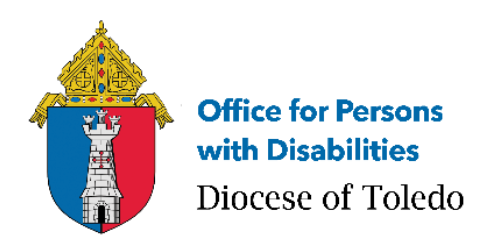
Feelings are not measured by IQ. Even those who cannot identify or express feelings still experience the full range of human emotions. Persons with intellectual disabilities historically have been sheltered from sensitive life issues they presumably couldn’t understand. Research shows that shielding persons with intellectual disabilities from end-of-life experiences causes more anguish than it avoids. Exclusion from hurt also excludes one from the supports that help to work through the grieving process. Also, the role someone with an intellectual disability plays in comforting others who share their sorrow should not be discounted. Here are some ways to help someone with an intellectual disability grieve:
Use life lessons to teach coping behaviors before a more serious personal loss, like the death of a parent, occurs. Learning to accept the loss of a pet, a friend moving away, the death of a famous person, or a natural disaster in another country will help
develop these skills.
-
Keep a person with an intellectual disability in the loop as families share information. Communicate in simple concrete terms, avoiding euphemisms or indirect language like, gone to sleep, or passed away. Understanding may be more intuitive than cognitive. Tell them what to expect during rituals: open casket, people crying, burial, etc.
-
Encourage them to pray, visit the sick and dying, view the body, and attend the funeral. If they are capable of making an informed decision and choose not to participate, respect their wishes.
-
Help the person express their feelings. If they are non-verbal, try pictures. Books Beyond Words have books about death available: https://www.amazon.com/When-
Somebody-Books-Beyond-Words/ dp/1901242900 -
Photos and other mementos may be helpful, especially as time passes. It may also be helpful to make a scrapbook as a tangible reminder of a loved one.
-
Avoid any major changes in routine, residence, or job, if possible, for one year following the death of a parent or primary caregiver.
-
Look for clues for troublesome grieving: physical ailments like headaches & stomachaches, dreams, withdrawal, and changes in eating habits.
-
Use natural community supports, such as pastors, physicians, and social workers, to assist even before problems arise. Few counselors specialize in grief for people with intellectual disabilities. If needed, find an experienced grief specialist who is willing to partner with a family member or caregiver who knows the individual well.
-
Do not rush the grieving process; there is no right or wrong timetable. Long after the loss, use anniversaries to commemorate births and deaths; visit the cemetery on holidays or special occasions to affirm a loved one lost, but not forgotten.
Van Dyke, Linda. Lessons in Grief and Death Supporting People with Developmental Disabilities in the Healing Process.
Thank you to the Diocese of Toledo for providing this resource!


